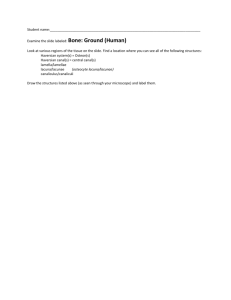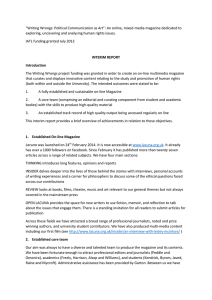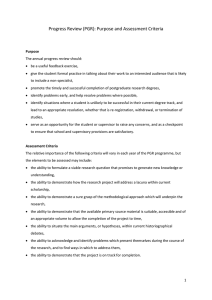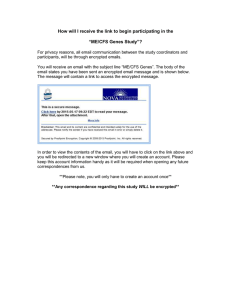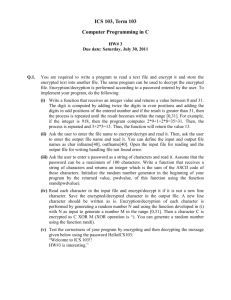Eternal Sunshine of the Spotless Machine: Protecting Privacy with Ephemeral Channels
advertisement
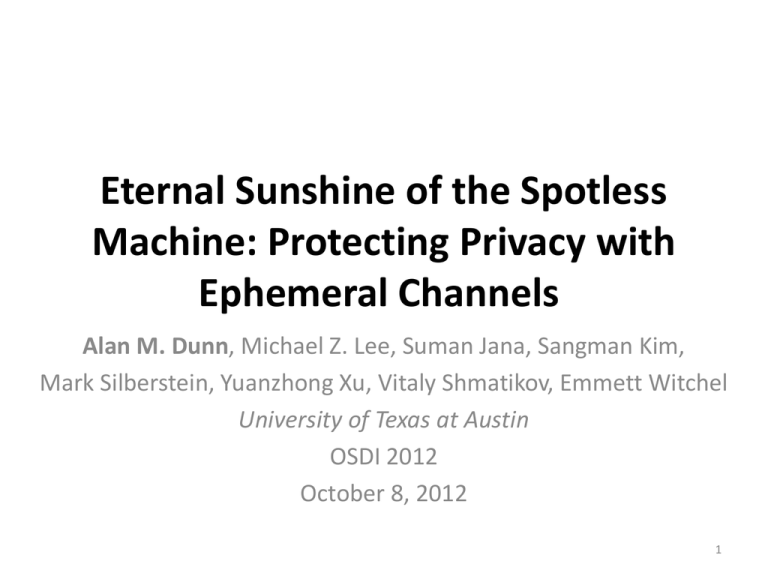
Eternal Sunshine of the Spotless Machine: Protecting Privacy with Ephemeral Channels Alan M. Dunn, Michael Z. Lee, Suman Jana, Sangman Kim, Mark Silberstein, Yuanzhong Xu, Vitaly Shmatikov, Emmett Witchel University of Texas at Austin OSDI 2012 October 8, 2012 1 Wanted: Application Privacy • Goal: Run programs without leaving traces VoIP conversation with lawyer Biomedical researcher accessing data Website access • Current state: Private browsing – Popular feature in web browsers – Ideal: When private browsing session terminates, all traces erased 2 A Privacy Problem • Private browsing unachieved – Evidence of site visits leaks into OS [Aggrawal, 2010] • Problem: No system support – Applications interact with user and world – Data leaks into OS, system services – Applications cannot remove traces they leave 3 Example: Browsing a Website X Network What traces still remain on the computer? Audio 4 Leaks From Browsing Memory contents: Complete packets, like: Network HTTP/1.1 200 OK Date: Mon, 17 Sep 2012 … Server: Apache/2.2.14 … … PulseAudio server X server caches, graphics drivers Audio 5 Secure Deallocation Is Not Enough • Secure deallocation: Zero memory when freed – Research implementation [Chow, 2005] – PaX: Security patch for Linux kernel • Sensitive data remains allocated – X caches, PulseAudio buffers not freed 6 Resisting a Strong Adversary • Goal: Provide forensic deniability – no evidence left for non-concurrent attacker • Once program terminated, protection maintained under extreme circumstances Root-level compromise (after program terminates) Computer physically seized 7 Goals • Provide privacy – Private sessions with forensic deniability • Maintain usability – Simultaneous private/non-private applications – Support a wide variety of private applications – “Pay as you go” - costs only for private programs – Impose low overhead 8 Lacuna • System to accomplish our privacy and usability goals • Host OS (Linux), VMM (QEMU-KVM) modified • Applications unmodified la·cu·na [luh-kyoo-nuh] 1. a gap or missing part, as in a manuscript, series, or logical argument... 9 Outline • Design – Erasable program container – Allow communication with peripherals • Evaluation – Lacuna provides privacy – Lacuna maintains usability 10 Erasable Program Container Process Process Program Process … VM contains Inter-Process Communication VM alone is insufficient 11 Communicating with Peripherals - Sensitive data Program X App 1 App 2 Program must communicate with Host OS peripheral Driver Dependencies on rest of OS 12 Communicating with Peripherals - Sensitive data Code with potential data exposure X App 1 Program App 2 Host OS Driver Dependencies on rest of OS 13 Two Peripheral Types - Sensitive data - Encrypted data 1) All Storage 2) other peripherals Solve with ephemeral channels Host OS Swap VM writes Encrypt dataleft Must ensurebefore no traces passes through later OS that are readable 14 Ensuring No Readable Traces Program Strategy 1: Leave no trace Host OS Strategy 2: Make traces unreadable later 15 Ephemeral Channels - Sensitive data Hardware ephemeral channel - Encrypted data Guest control of hardware Encrypted ephemeral channel Traces now cryptographically erased Host OS Erase channel key Proxy (complex OS paths) 16 Channel Type Comparison Host drivers unmodified Host code never sees unencrypted data Hardware virtualization support unnecessary Guest modification unnecessary Hardware Encrypted (No graphics) (Run Windows, Linux, unmodified programs) 17 Encrypted Graphics Channel • No hardware virtualization support for graphics • Solution: Encrypt VM output to GPU memory GPU memory CUDA Host OS Driver Emulated graphics card 18 Hardware USB Channel Controller under Switch into guest control private mode non-private Controller: private USB mouse USB keyboard Host OS Driver USB host controller HW Encrypted USB, audio, network channels described in paper 19 Sanitizing Storage • Encrypt VM writes to storage – VM image file unmodified – Diffs file contains VM writes to storage – Diffs file encrypted • Leave no evidence of which storage locations read – Free buffer cache pages for VM image file only • Encrypt swapped memory from private VM – Encrypt swapped pages for VMM process only • Encryption keys erased on VM exit • Techniques here “pay as you go” 20 Evaluation • Lacuna provides privacy – Measure that Lacuna does not leak private data – Quantify size of code that handles sensitive data • Lacuna maintains usability – Low switch time to private environment – Application performance near that of running program in VM • More evaluation in paper 21 Lacuna Protects Privacy • Experiment to locate leaks • Inject random “tokens” into peripheral I/O paths, scan memory to locate [Chow, 2005] • Tokens almost always found without Lacuna • Tokens never found with Lacuna Host OS … 0x2a 0xbf 0x3c 0xb1 0x70 0xc6 0x6e 0x82 22 Little Code Handles Sensitive Data Subsystem Lines of Code Graphics Sound 725 (CUDA) 200 (out) 108 (in) 414 USB Network 208 • Measurements are lines of code outside of QEMU that handle unencrypted data – Data within QEMU erased at VM exit 23 Time to Switch to Private Programs is Low Channel Type Switch Time (s) USB passthrough (encrypted) keyboard 1.4 ± 0.2 keyboard + mouse 2.3 ± 0.2 PCI assignment (hardware) keyboard 2.4 ± 0.2 keyboard + mouse 3.8 ± 0.2 • USB driver disconnect significant (0.8-1.0 s) • Switch time achieved by eliminating two extra disconnects in guest USB initialization 24 Impact on Full-System Workloads is Low • Benchmarks – MPlayer: Watch video in across network – Firefox: Browse Alexa top 20 websites – LibreOffice: Create 2,994-character, 32-image document • No execution slowdown, higher CPU utilization Video (75 s) Browser (20 s) Office Suite (175 s) QEMU 32.2 ± 7.4 25.9 ± 1.3 8.1 ± 1.2 Lacuna 49.7 ± 0.3 (+ 17.5) 46.2 ± 1.5 (+ 20.3) 21.1 ± 0.6 (+ 13.0) Worst case: additional Measurements are % CPU utilization 20 percentage points • CPU utilization lowered by hardware AES (AES-NI) 25 Conclusion • Modern computer systems leak secrets • Lacuna provides forensic deniability: secrets removed after program termination • Ephemeral channels provide private peripheral I/O • Lacuna runs full-system workloads efficiently 26
